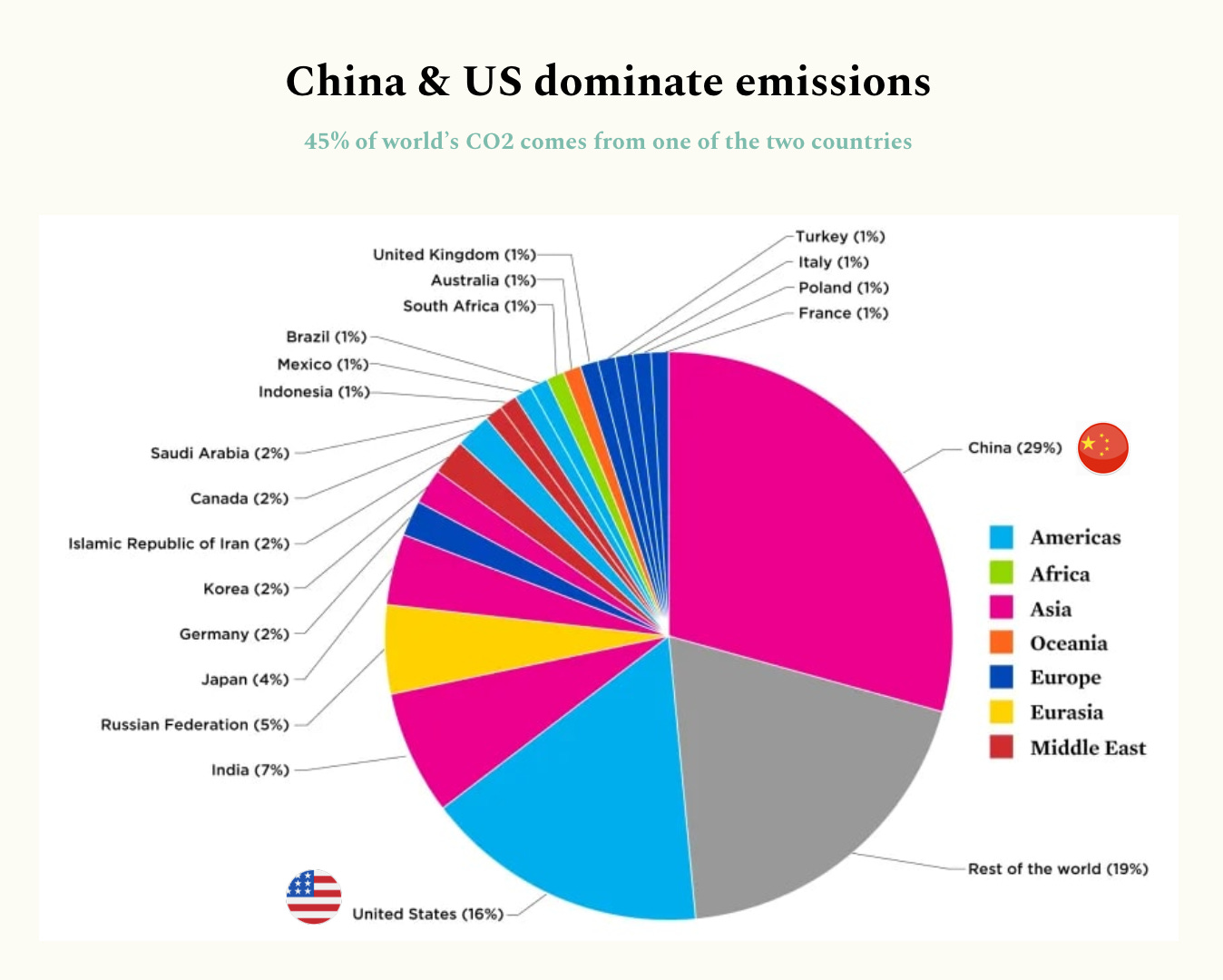
Hi friends,
My name is Charlie, I’m filling in for Mario this week from London. As he mentioned last week, I’m an Associate Editor at Minerva Research where I cover technology, among other topics. I hope you enjoy!
In this week’s BB, you’ll learn about…
🤖 Why text is scarier than video
🛠 Why treating AI R&D as an arms race is a bad idea
🛢️ Carbon emissions by country (🇨🇳🇺🇸👀)
👶🏼 The firm cashing in on grownups who won’t do their homework
🍌 Bad ads, Martian decor, celebrity salami, and a $120,000 banana
—
🕰️ If you’re new to The Generalist, you can check out our recent breakdowns of Synthetic Meat, Prison, Addiction, and No Code.
💓 If you’ve been digging the Briefing and would like to help, the #1 thing you can do is share this email with someone brainy and fun to be around.
🐰 Overheard
(Quotes from clever people)
When you look at disinformation campaigns, the amount of manual labor that goes into creating fake websites and fake blogs is gigantic. If you can just simply automate believable and engaging text, then it’s really flooding the internet with garbage in a very automated and scalable way. So that I’m pretty worried about.
Cybersecurity researcher Camille François makes the sensible point that shonky deep fake videos are fun to get worked up about, but believable text that can be mass generated — by something like OpenAI’s GPT-2, for example — is the bigger threat to the internet. And our grip on what’s real.
François calls them “read fakes”, which I hope doesn’t catch on.
✏️ Monitoring: Chinese AI isn’t (that) scary. America’s response is.
(One space worth keeping an eye on)

The problem: US military leaders bang on about China all the time, specifically about Chinese military spending on AI and other high tech kit. Blocking China’s tech sector has become a totemic cause, leading to all kinds of counterproductive nonsense like the obsessions with rare earths* and Huawei**.
But recent research shows that while China is probably outspending the US on AI R&D, a relatively small proportion of that money is spent on defense. But in the US, more AI R&D money is spent on military applications than on anything else***. The problem is that “military AI” is inherently scary, so it doesn’t really matter who’s making it. Obviously there are some good uses for AI in the military, mostly focused on making logistics more efficient, and making lethal processes more precise (better object recognition for missiles might save some lives in collateral damage, for example). But “military AI” also means increased autonomy for lethal systems like drone swarms.
The debate around lethal autonomous weapons is only slightly less boring than the wider conversation about “AI ethics” (and that’s only because in the former case you can use phrases like “killer robots”). The main thing people seem to have agreed on is that we should really try not to invent lethal autonomous weapons at all. Increased US military AI spending driven by imaginary fears of Chinese supremacy is a step in the wrong direction.
The solution: There are lots of people who work constantly on these questions, so I’ll refer you to them for solutions. The most interesting stuff seems to be coming from CSET in Georgetown, CSER in Cambridge (UK), and FHI in Oxford. So far there have been a lot of countries and companies writing lists of “AI principles”, most of which are deeply uninspiring. If you’re clever and don’t want to die pointlessly at the hands of a glitchy drone-swarm, maybe go and work on it.
—
Footnotes
*Rare earths aren’t rare, and China only “controls supply” because they’re prepared to do the dirty work of mining and processing at a cost no-one else can compete with. If they cut supply at all prices would rise, and currently-shuttered US projects would become cost-effective again. That’s one reason why rather than cutting supply as many in Washington fear, China has raised its production quota again this year.
**Huawei can now make smartphones with no US parts. This is no surprise, Chinese semiconductor capabilities have improved massively in recent years. All this trade war blacklisting fuss has done is accelerate China’s independence from US chipmakers.
***One obvious caveat to all this is that if you’re China, you can spend money on whatever you want (that’s the fun thing about state-capitalism), but if you’re the US your R&D spending options are mostly military. So if you’re a US official worried about falling behind in the so-called “AI race”, the levers you can pull are all called things like In-Q-Tel and DARPA. This might slightly skew the proportions of who’s spending what, but in absolute terms the US is still outspending China nearly 2:1 on military AI.
🖼️ 1000 words
(Something to look at)

The major offenders. Pie charts look rubbish, I know, but this is worth staring at for a bit. Even if industrial heavyweights like Germany and Japan fully decarbonized it would barely move the needle. In fact the whole of Europe could go green and it wouldn’t matter much.
Another useful datum: burning coal to make electricity creates 30% of global emissions. Air travel makes up just 2%.
😱 Signs of the apocalypse
(Look on my Works, ye Mighty, and despair!)
Focused — Californians pay someone to be their mum, version #6,432,198. Focused is a San Francisco startup where you pay $40 to be watched while you do your homework. But for grownups. You want to write that first chapter of your novel, or put together a proper business plan for that side hustle you’ve been daydreaming about. You want to, but not enough to actually do it. These guys will let you pay them to make you do it. I don’t mean to be unkind, you know. But get a grip.
🐒 Long tail
(Best of the rest)
That Peloton ad everyone hated. The main takeaway from this creepy episode is that “X is like Black Mirror” stopped being an interesting take ages ago. The second takeaway is that the backlash knocked $1.5B off the value of the company.
Larry and Sergey are leaving Alphabet (sort of). They’ll keep their seats on the board — where they still control 51% of the voting rights between them — but Sundar Pichai will take the reins as CEO. Given the enormous headache regulators are going to give tech leaders in the coming years, I’d be tempted to make someone else “responsible and accountable” too.
Ikea want to decorate Mars habitats. They sent some designers to live in Nasa’s mocked-up Mars habitat in the desert. The designers came up with some fun things.
An artist sold a banana duct-taped to a wall for $120,000 at Art Basel Miami. It has apparently been eaten.
A startup wants to grow some Kanye meat in a lab and make it into salami. A similar firm wants to grow meat from extinct animals, starting with Mammoth steak. The CEO’s name is Michael Tusk.
China has raised its electric car targets to 25% by 2025. This is more a response to air pollution problems and expensive oil imports than any pious concern for the environment. But if a chunk of the electricity used to power these cars comes from renewables rather than coal, it will be a big deal.
Go Away. The luggage brand got into a spot of bother this week with The Verge publishing revelations of a toxic, emotionally-abusive workplace. Interestingly, much of the trouble appeared to stem from the company’s obsession with “transparency” which prohibited employees having side-chain conversations on Slack or email. As tech continues to fetishize this value, we may see more cases in which a supposed desire for openness quashes discourse.
Apple is now worth more than the entire US energy sector. Sensible of Apple to have a flagship product that is almost guaranteed to need replacing within a few months. For those of you trying not to lose your second or third pair of AirPods, Nordstrom will sell you a strap that turns them back into normal headphones.
🧩 Puzzler
(A question, conundrum, or riddle to mull over)
In my family we eat Fish on St David’s day, Crab on US Independence Day and Goat on Christmas Day. What do we eat on Halloween?
The answer to last week’s hotel-based puzzle was “why would he knock on the door to his own room?” — Congrats to MWF (🥇), NMT (🥈) and Komodo K (🐉) for getting there.
As a big fan of this newsletter it’s been a great pleasure writing it. If anyone has any questions, objections, or offers off highly-paid consulting work, please do get in touch. Ask Mario for my email address if you want to start a conversation. I’ll be delighted to hear from you.
Wishing you all a lovely, restful Sunday. 💙


